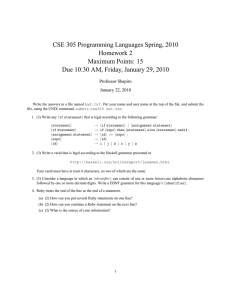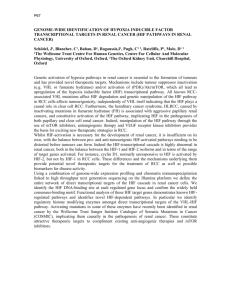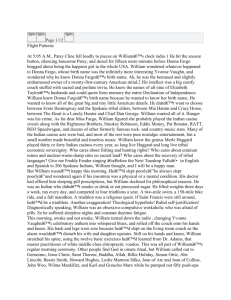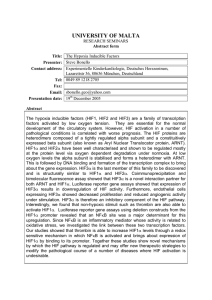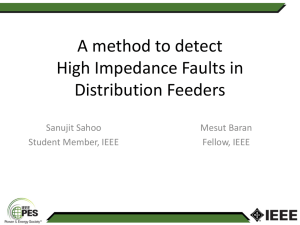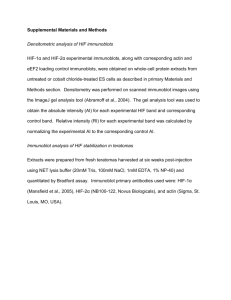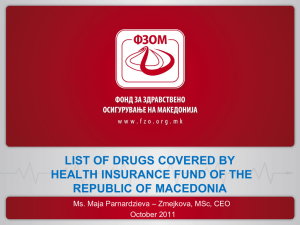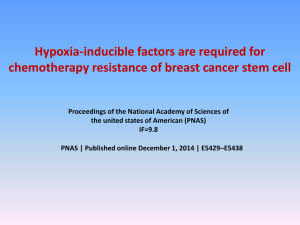Piloting the Health Impact Fund - Academics Stand Against Poverty
advertisement
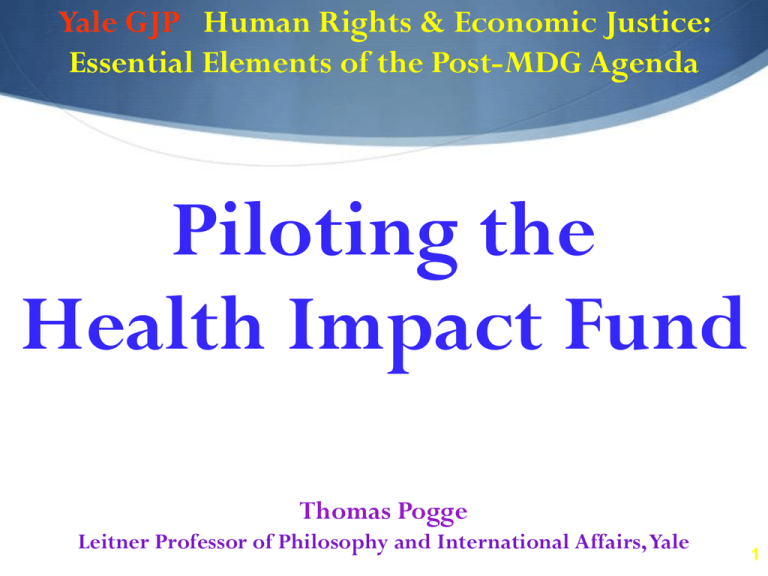
Yale GJP Human Rights & Economic Justice: Essential Elements of the Post-MDG Agenda Piloting the Health Impact Fund Thomas Pogge Leitner Professor of Philosophy and International Affairs, Yale 1 Human Progress … has two interlinked components: Innovation — creation, invention, discovery; and Diffusion — dissemination, uptake. Insofar as either component is stifled, humanity’s progress is impeded. The Dilemma We have learned that the speed and quality of innovation can be substantially raised by granting innovators temporary monopolies (patents, copyrights) that enable them to profit by charging high mark-ups. But such temporary monopolies facilitate innovation at the expense of diffusion. Rules Governing the Development and Distribution of New Medicines At present, pharmaceutical innovation is rewarded through product (vs. process) patents of minimally 20-year duration which the World Trade Organization — under the Trade-Related Aspects of Intellectual Property Rights (TRIPS) Agreement — requires its member states to grant. (1) The Present System Does Poorly in regard to Access Universal access is gravely undermined, even in affluent countries, by large mark-ups and, after the patent period, by inadequate incentives for the competent provision of generics to patients who are poor or hard-to-reach. (2) The Present System Does Poorly in regard to Targeting Focused innovation is distorted by huge economic inequalities, which steer innovators away from diseases predominantly affecting the poor and also excessively reward the development of new “me-too” and maintenance drugs. (3) The Present System Does Poorly in regard to Cost-Effectiveness Overall efficiency is greatly diminished by lobbying and gaming, by patenting and litigation, by wasteful marketing and counterfeiting, as well as by huge deadweight losses. The Health Impact Fund www.HealthImpactFund.org The HIF is a complement to TRIPS, offering • voluntary registration of any new medicine • for participation in ten consecutive fixed annual reward pools • each of which is divided among registered products according to their health impact (in QALYs) around the world. The Health Impact Fund www.HealthImpactFund.org • Savings from lower drug prices help governments fund the HIF at initially $6 billion annually (0.01% of ΣGDP). • Registrant may keep intellectual property rights, but must sell the new medicine at the lowest feasible average cost of manufacture and distribution and grant cost-free licenses after the reward period. • This price ceiling is generally to be determined by a tender, which generic manufacturers in developing countries are favored to win. (1) The HIF Avoids High Prices All HIF-registered products are available at or below cost from day one. Poor people get better access to important new medicines: through their own funds or through national governments, NGOs or international agencies. (2) The HIF Ends the Neglect of the Diseases of Poverty The HIF adds powerful targeting incentives to develop new medicines with the greatest health impact — regardless of the socio-economic composition of the patient population. In regard to these diseases, research firms in the developing world are at peak competitiveness: no head start by “Big Pharma,” easy availability of patients (trials), highly committed work force, supportive political and social environment. (3) The HIF Boosts Cost-Effectiveness By reducing costs and losses due to: • Patenting in many jurisdictions • Litigation • Marketing • Counterfeiting • Gaming • Lobbying • Deadweight losses Bonus: The HIF Alleviates Last-Mile Problems in Drug Delivery By combining substantial rewards with low product prices, the HIF encourages efforts toward: 1 Efficacy (freshness, transportation, storage) 2 Targeting of patients who can benefit the most 3 Affordability (price below ceiling to boost reach) 4 Careful prescribing with proper instructions 5 Promotion of high compliance and adherence. Piloting the HIF We have a USD 2m commitment toward a joint HIF pilot from Janssen (part of J&J), involving their new drug against multi-drug-resistant tuberculosis: Sirturo (bedaquiline), which is already FDA-approved. Because J&J will contribute the drug at zero cost, this pilot will only refine the measurement of health gains and of the preservation of the drug’s efficacy. Waiting for drug approval in India, we are establishing — with € 2m from the European Union — the baseline against which health gains will be measured. Benefits of this Pilot • Develop an integrated metric & measurement methodology for comprehensive health impact assessment. • Establish defined procedures for its reliable application. • Promote integrative and regional systems in health care: from innovation to health care delivery. • Serve pilot-area patients who gain access to a needed product, competently provided at an affordable price. Three Adaptations Extension to clean/green technologies: free access to patented knowledge in exchange for rewards proportioned to emissions averted. Extension to agricultural innovation: pay innovators on the basis of incremental nutrients delivered or use of pesticides and fertilizers avoided. Extension to educational innovation: free www learning platform where competing providers can offer courses toward diverse qualifications.

